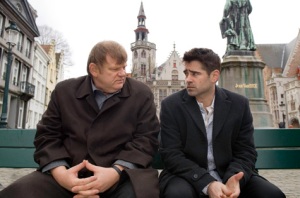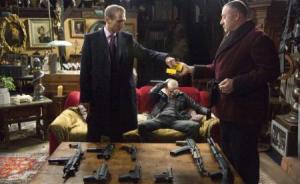“After I killed him, I dropped the gun in the Thames, washed the residue off me hands in the bathroom of a Burger King, and walked home to wait for instructions. Shortly thereafter the instructions came through – “Get the fuck out of London, you dumb fucks. Get to Bruges.” I didn’t even know where Bruges fucking was. It’s in Belgium.”
The opening narration to 2008’s In Bruges serves as a master class in distilling the essential plot and thematic elements of a film into a minute’s worth of exposition. We know our narrator has committed a murder at the behest of someone else but things didn’t go as planned, forcing him into hiding. He’s not alone though and between his thick Irish accent and the mention of Belgium and the Thames, it’s established that the story is European in origin. The peaceful evening opening shots of the titular small town of Bruges contrast sharply with our narrator’s brusque vernacular, such that we know he’s not being put into protection so much as he’s being put into exile. Finally, that we are witnessing his punishment and not his actions exposes that In Bruges is more occupied with consequences than actions, and what follows is a wonderfully original little morality play of assassins, existence and tourism.
When the title card draws up we hear our first piece of dialogue; “Bruges is a shithole,” contends Ray (Colin Farrell), our narrator and newly initiated hitman. “Bruges is not a shithole,” responds his partner and semi-mentor Ken (Brendan Gleeson), a man of the same profession but many years and kills Ray’s senior. Despite differing views on the quality of their getaway, Ray and Ken aren’t a poorly matched odd-couple, they just deal with waiting to hear of their fate with differing tact. Ken, the more level-headed of the two, embraces the prospect of two-weeks in the fairytale-town as a kind of reprieve from a life too long lived; Gleeson’s contentedness masks a world-weariness that’s palpable when he’s not busy baby-sitting his ward. Ray, the younger man, would much rather pass the time getting pissed at the pub than spend it admiring the culture and architecture of a sleepy little town no one has ever heard of. Even when corralled by Ken into seeing the sights, Ray finds a way to ruin the local idyll for not just his partner, but a good number of people from across the world that happen to have come to Bruges.

As it happens, Ray’s skittish behaviour is as much a product of guilt as it is boredom. It turns out that Ray committed two murders on the assignment mentioned in the prologue, one intended and one accidental. He shows no regret over killing his intended target; he’s a hitman, he’s trained for that. What’s haunting him is the life he didn’t mean to take, and it’s Ray’s internal struggle over what he deserves for his actions that forms a foundation for In Bruges’ existential leanings. Bruges starts as an unassuming hideout but as the two outlaws explore it, all manner of symbolic imagery give the town an ethereal quality. The medieval architecture and Christian artwork convey a spiritual atmosphere and in turn, Ken and Ray’s discussions of their work develop a fascinating subtext. The only murder Ken regrets, also accidental, is that of an elderly lollipop salesman who came at him with a bottle but it’s written-off by Ray as self-defence since a bottle is a deadly weapon. “Well, technically your bare hands can kill someone too,” replies Ken, “what if he knew karate?”
The pitch-black humour undercuts much of the deeper questioning posed by the two leads, yet there's a fanciful poetry to this shaggy, morbid story. Whether it’s the author, God, or fate, there’s a higher power guiding the characters, be it in the form of Ray and Ken’s forced exile, or the various folk that populate the town at the time of their arrival. There’s a dwarf actor shooting a dream sequence featuring all manner of extras dressed in animal skin, as well as his dealer, a beautiful Belgian girl who catches Ray’s fancy, and numerous other small characters that nonetheless develop a Shakespearean level of intentional and unintentional involvement in the development of the story. The connectedness of the storytelling, when combined with the singular location, makes the film appear as though it could be adapted to the stage, unsurprising given the directors history in the theatre, and In Bruges is at its most cinematic during its later action sequences. When mob boss Harry decides to take care of Ray’s mistake personally (his reason’s being quite hilariously justified), the film’s third act features a few shoot-out and chase set pieces but given the well-developed characters and heady themes, there’s a weight to the violence that’s refreshing for the genre. In particular, the rarity and import given to guns makes them appear not as disposable thrill machines but as necessary elements of the plot and the deaths they bring are powerful because the film maintains such a modest body count.

With all the veiled musing over death and existence, it’s easy to forget that In Bruges is often brilliantly funny. While Ray’s flagrantly un-PC attitude brings out some great moments (such as the dwarf actor’s tirade about the inevitability of a global race war), the film is welcomingly as interested in subjects such as the banality of a career in professional assassination. When Ken has to pantomime the presence of Ray while on the phone with his boss, Gleeson’s performance wrings every laugh out of the quietly humiliating lengths one will go to in order to placate their superior, even if they happen to be a deadly killer. The script is chockfull of little character details, such that even Ralph Fiennes manages to give off a sense of not just humanity, but normalcy to his portrayal of the gangster Harry, a role that easily could have devolved into caricature. With this film, writer-director Martin McDonagh has established himself as a confident and energetic presence both on the page and behind the camera and his next feature will no doubt draw much anticipation. It’s also destined for scrutiny though because In Bruges is a tough act to follow. It’s funny and well-acted but also maintains a depth and emotional core largely unseen in comedy crime-fiction, and the result is a wholly-unexpected but eminently enjoyable little masterpiece.
5 out of 5
In Bruges
2008, UK
Directed by Martin McDonagh


